The US and Chinese militaries this week held “frank and constructive” maritime security talks, the Chinese navy said yesterday, as the two superpowers gradually restore military-to-military communications after several months of trade tensions.
The working-level meetings took place from Tuesday to Thursday in Hawaii, according to a post on the official social media account of the Chinese People’s Liberation Army Navy.
US and Chinese military officials previously held talks in April — the first such working-level meeting on military issues since the beginning of the second term of US President Donald Trump. The twice-yearly talks are known as the military maritime consultative agreement working group.

Photo: EPA
“The two sides had frank and constructive exchanges ... mainly exchanging views on the current maritime and air security situation between China and the US,” China’s navy said in its statement.
China also criticized US freedom-of-navigation operations in the statement. These are frequently carried out in the Taiwan Strait and South China Sea, international waters over which China claims sovereignty.
“China ... resolutely opposes any infringement and provocation,” China’s navy said, referring to those maritime and overflight transits by US forces.
Both sides also discussed “typical cases of naval and air encounters between the two militaries... to help the frontline naval and air forces of China and the US interact more professionally and safely,” it said.
US Secretary of Defense Pete Hegseth raised concerns about Chinese activity in the South China Sea and around Taiwan in a meeting with Chinese Minister of National Defense Dong Jun (董軍) last month.
China has been steadily increasing air, naval and coast guard deployments around Taiwan.
The Pentagon has been pushing for improved communications with China over its military modernization and regional posture, calling for greater transparency on its nuclear weapons build-up and more theatre-level discussions with military commanders.
The working group would have a follow-up meeting next year, the statement said.

MAKING WAVES: China’s maritime militia could become a nontraditional threat in war, clogging up shipping lanes to prevent US or Japanese intervention, a report said About 1,900 Chinese ships flying flags of convenience and fishing vessels that participated in China’s military exercises around Taiwan last month and in January last year have been listed for monitoring, Coast Guard Administration (CGA) Deputy Director-General Hsieh Ching-chin (謝慶欽) said yesterday. Following amendments to the Commercial Port Act (商港法) and the Law of Ships (船舶法) last month, the CGA can designate possible berthing areas or deny ports of call for vessels suspected of loitering around areas where undersea cables can be accessed, Oceans Affairs Council Minister Kuan Bi-ling (管碧玲) said. The list of suspected ships, originally 300, had risen to about

DAREDEVIL: Honnold said it had always been a dream of his to climb Taipei 101, while a Netflix producer said the skyscraper was ‘a real icon of this country’ US climber Alex Honnold yesterday took on Taiwan’s tallest building, becoming the first person to scale Taipei 101 without a rope, harness or safety net. Hundreds of spectators gathered at the base of the 101-story skyscraper to watch Honnold, 40, embark on his daredevil feat, which was also broadcast live on Netflix. Dressed in a red T-shirt and yellow custom-made climbing shoes, Honnold swiftly moved up the southeast face of the glass and steel building. At one point, he stepped onto a platform midway up to wave down at fans and onlookers who were taking photos. People watching from inside

Japan’s strategic alliance with the US would collapse if Tokyo were to turn away from a conflict in Taiwan, Japanese Prime Minister Sanae Takaichi said yesterday, but distanced herself from previous comments that suggested a possible military response in such an event. Takaichi expressed her latest views on a nationally broadcast TV program late on Monday, where an opposition party leader criticized her for igniting tensions with China with the earlier remarks. Ties between Japan and China have sunk to the worst level in years after Takaichi said in November that a hypothetical Chinese attack on Taiwan could bring about a Japanese

The WHO ignored early COVID-19 warnings from Taiwan, US Deputy Secretary of Health and Human Services Jim O’Neill said on Friday, as part of justification for Washington withdrawing from the global health body. US Secretary of State Marco Rubio on Thursday said that the US was pulling out of the UN agency, as it failed to fulfill its responsibilities during the COVID-19 pandemic. The WHO “ignored early COVID warnings from Taiwan in 2019 by pretending Taiwan did not exist, O’Neill wrote on X on Friday, Taiwan time. “It ignored rigorous science and promoted lockdowns.” The US will “continue international coordination on infectious